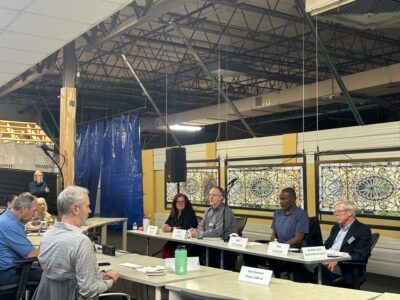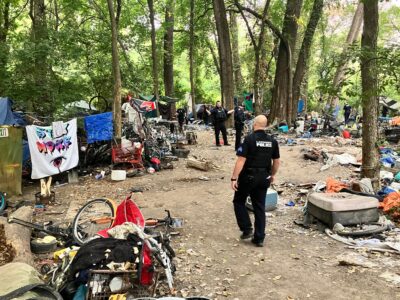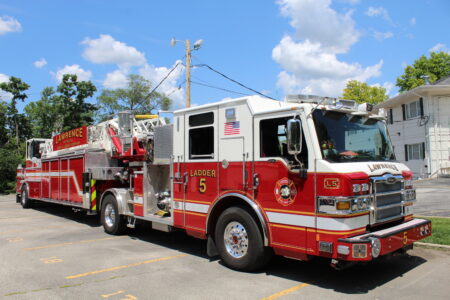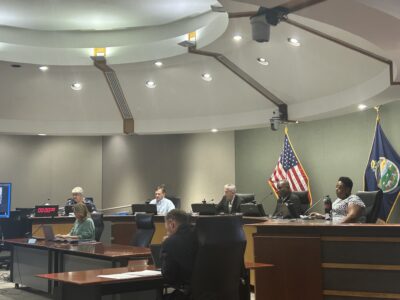Lawrence City Commission to consider approving financial incentives for $300M second phase of KU’s Gateway project
Project is eligible for nearly $95M in state, local incentives

photo by: MultiStudio
A ground level view of the proposed Gateway project at David Booth Kansas Memorial Stadium is shown in this rendering.
Tuesday is set to be decision day for what leaders are calling Lawrence’s largest development project in modern history — the approximately $750 million Gateway district around the University of Kansas’ football stadium.
Lawrence city commissioners on Tuesday will consider a variety of financial incentives that would allow the $300 million second phase of the Gateway project to begin at 11th and Mississippi streets on the northern edge of the KU campus.
The $300 million of new development is in addition to about $450 million worth of work that is nearly complete. That work included rebuilding the west side and south end of David Booth Kansas Memorial Stadium and constructing a conference center at the north end of the stadium. The stadium is set to open Aug. 23 for its first game, and the conference center with its 1,000-seat banquet room is scheduled to begin hosting events this fall.
What city commissioners are being asked to approve on Tuesday is a major package of financial incentives for the second phase of the project, which would build a hotel that connects to the conference center, new parking, new student housing and space for businesses.
All that has been clear for a while, but commissioners and the public now have more clarity on one key point: the total size of the incentive package. The second phase of the project is eligible for $94.6 million worth of incentives, according to a new city staff memo on the project. That means about 27% of the total cost of the second phase could be receiving financial incentives, which will come from a mix of state and local funds.
Most of the incentives come in the form of the state and city agreeing to not fully collect the new tax dollars that the project is expected to create. Rather, KU and its development partners would be allowed to use those new tax revenues to pay for infrastructure and other such improvements at the site.
Specifically, the City Commission will consider executing a development agreement between the city and KU and approving two taxing districts, a STAR Bond district and a tax increment financing district for the second phase of the Gateway project.
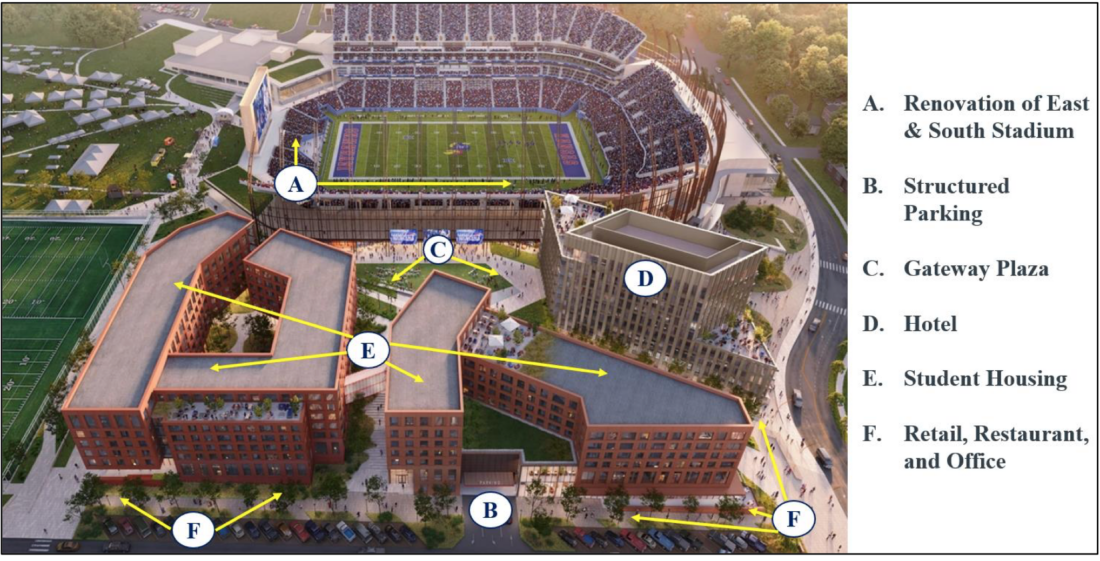
photo by: University of Kansas
A concept of KU’s Gateway District, as provided to the Lawrence City Commission for review.
Commissioners approved the creation of the boundaries for the tax districts in May, as the Journal-World reported, on a 4-1 vote; Commissioner Amber Sellers was the lone no vote. The vote Tuesday will need a supermajority — four out of five commissioners — to approve the incentives.
Ahead of the vote in May, City Manager Craig Owens recommended the project, in part, because of an agreement between the city and KU where the university would provide at least $4 million worth of land to be used for affordable housing projects, and the city would have rights to up to $14.5 million in new tax revenues created by the development to improve the Ninth Street corridor and stormwater systems near the football stadium, as the Journal-World reported.
Those details, and other stipulations, are in a development agreement as part of the project, according to a city memo. The agreement includes provisions which would cap the maximum amount of bonds that may be contributed to the university’s project at $94.6 million, which is about 27% of the costs for this phase of the development; require KU to provide evidence it can complete “the entirety of the project” before any bonds would be issued; and ensure that KU commits to “establishing an off-campus housing office” to assist in relations between off-campus students and city residents.
KU officials have touted the Gateway project and convention center as a major economic development driver for all of Lawrence, and particularly downtown. The plans for the second phase call for a 162-room hotel, 443 beds of student housing, 43,000 square feet of retail, restaurant and office space, and approximately 1,000 parking spaces that will be in a mix of underground parking garages and new surface parking lots
Multiple business groups in Lawrence, including the chamber of commerce, Downtown Lawrence Inc. and Explore Lawrence have expressed support for the project because of the potential to bring more visitors to the city. The Lawrence-Douglas County Housing Authority also previously expressed support due to the promise of the $4 million gift for affordable housing. Other residents have been against the project, including people who live in neighborhoods around the stadium who have felt left out in the planning process.
Tuesday night’s vote would represent the final approvals of the City Commission in regards to the development agreement and establishing the tax incentives, but additional approvals will still be necessary before any bonds for the project are issued. A city memo notes that KU expects to be in position to request the issuance of the first tranche of city bonds in the first half of 2026.
In other business, commissioners will consider setting a public hearing to potentially provide incentives to redevelop a historic downtown building into a mixed-use building.
The commission will consider setting a public hearing for Sept. 9 to consider a request by developers of the Reuter building, at 612 New Hampshire St., for a Neighborhood Revitalization Act property tax rebate.
As the Journal-World reported, a private developer in Lawrence sent an application in December 2024 seeking an incentives package that would include a 95% tax rebate on the project’s new construction for the next 22 years, and the creation of a new sales tax district that would add a special 2% sales tax to any purchases made within the building for the next 22 years.
The development hopes to convert the four-story limestone building first built in 1882 — which nearly collapsed before construction crews saved the building in 2023 — into a mixed use building that will house 10 apartment units and four commercial units. Additionally, a smaller building just south of the Reuter building would be developed into a space with three commercial units.
The item is a part of the commission’s consent agenda, a group of items which are normally approved under one vote.
Commissioners will meet at 5 p.m. Tuesday at Lawrence City Hall, 6 E. Sixth St.



